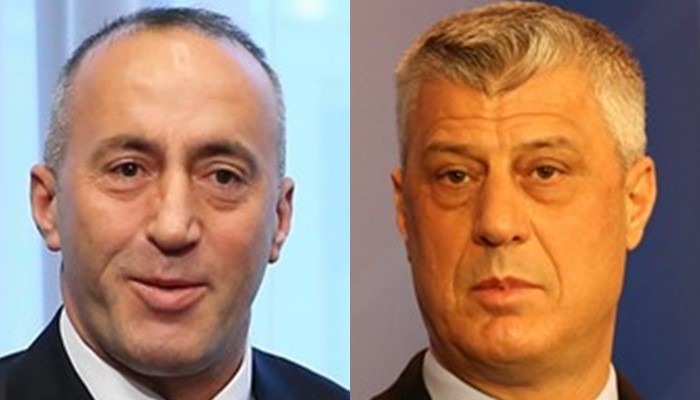Kosovar President Hashim Thaci in a televised interview with T7 admitted for the first time that the arrest and deportation of six Turkish men suspected of links to Fethullah Gülen’s movement was wrong, Gazeta Express reported on Thursday.
In a development that caused outrage around the world, the Kosovo police on March 29 arrested five educators working at schools linked to the faith-based Gülen movement in Kosovo as well as a doctor, after which Turkey’s National Intelligence Organization (MİT) rendered them to Turkey.
Immediately after the incident, Prime Minister Ramush Haradinaj fired the Kosovar interior minister and secret service chief for failing to inform him about the arrests.
Thaci on March 31 said he was informed by the intelligence service that “their arrest and deportation was related to their illegal and dangerous activity in Kosovo.”
“This process should not have happened under any circumstances. The action against them was wrong. Relevant mechanisms should explain in details of what has happened with the deportation of the Turkish men,” Thaci said, contradicting his earlier public stance.
According to Gazeta Express, President Thaci also disagreed with a statement of Turkish President Recep Tayyip Erdoğan aimed at Haradinaj.
Erdoğan on March 31 lashed out at the Kosovar prime minister for dismissing the interior minister and secret service chief over the abduction of the six Turkish nationals to Turkey, threatening that he would pay for it.
“I am asking: O! Prime minister of Kosovo: Under whose orders did you take such a step? Since when did you start to protect people who tried to carry out a coup against Turkey?” he said.
Thaci said he finds Erdoğan’s statements “unnecessary.”
“I don’t agree with the opinions addressed towards Kosovo leadership. Kosovo is not a place neither for Gulenism, nor Erdoganism,” Thaci was quoted as saying by Gazeta Express.
Maja Kocijancic, an EU spokesperson, on April 4 slammed the March 29 arrest and deportation of the six Turkish nationals from Kosovo due to their links to the Gülen movement, saying the incident raises questions about respect for the due process of law.
“The arrest and subsequent deportation of six Turkish nationals legally residing in Kosovo raise questions about the respect of the due process of law,” said Kocijancic, adding that the rule of law is a fundamental principle of the European Union.
On April 16, 28 members of the European Parliament including Rebecca Harms, spokeswoman for foreign affairs and expert on Turkey in the European Parliament’s Greens/EFA group, wrote a letter to Thaci and Haradinaj protesting the detention and deportation to Turkey of six Turkish citizens last month.
“Their residence permits have been cancelled without any legal procedure and they have been deported without any trial or any contact with their lawyers in violation of the principle of rule of law. We strongly criticise these grave events,” said the MEPs in their letter.
Urging Kosovo to respect all judicial procedures in line with European principles and standards, the MEPs said: “All actions taken by local Kosovar authorities must be in full respect of the rule of law and promotion of universal respect for and observance of human rights and fundamental freedoms. Arbitrary procedures concerning arrest, detention or extradition are in violation of these principles.“
The MEPs said they trust in Kosovo’s authorities to maintain a strong stance on human rights and the rule of law and “that it will withstand the pressure Turkey is systematically exerting.”
President Erdoğan and his ruling Justice and Development Party (AKP) government pursued a crackdown on the Gülen movement following corruption operations in December 2013 in which the inner circle of the government and then-Prime Minister Erdoğan were implicated.
Erdoğan also accuses the Gülen movement of masterminding a failed coup attempt in Turkey on July 15, 2016.
Despite the movement strongly denying involvement in the failed coup, Erdoğan launched a witch-hunt targeting the movement following the putsch.
The European Commission (EC) on April 17 called on the Turkish government to “lift the state of emergency without delay,” saying that widespread dismissals, arrests and detentions continue to raise serious concerns.
Citing “the broad scale and collective nature, and the disproportionality of measures,” the EC in its “2018 Report on Turkey” said: “Since the introduction of the state of emergency, over 150 000 people were taken into custody, 78 000 were arrested and over 110 000 civil servants were dismissed whilst, according to the authorities, some 40 000 were reinstated of which some 3 600 by decree.”
Turkish Interior Minister Süleyman Soylu on Jan. 5 said 234,419 passports have been revoked as part of investigations into the Gülen movement since the failed coup.
On Nov. 16 Soylu had said eight holdings and 1,020 companies were seized as part of operations against the movement.



